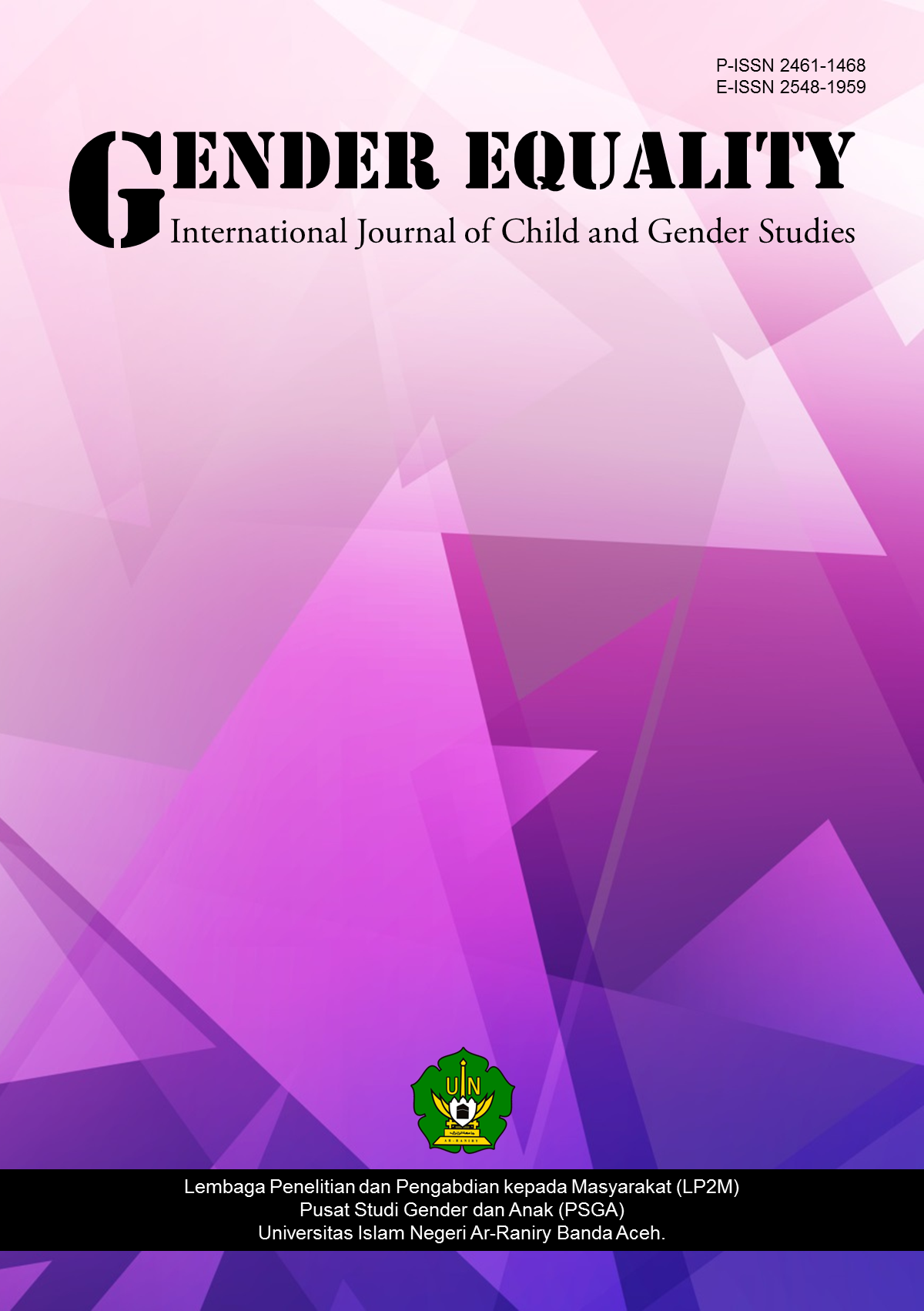KAPASITAS PEREMPUAN DI MASA PANDEMI: STUDI CVA PADA PEREMPUAN PERAJIN REYENG
DOI:
https://doi.org/10.22373/equality.v7i1.8673Keywords:
Gender analysis, CVA, Capacity, Covid-19 pandemic, Women.Abstract
This paper discusses the capacities of women during the Covid-19 pandemic. In Indonesia, Covid-19 has changed many aspects. Haphazard policy making also adds to the workload of the community, both in the domestic and public sphere. Women as agents who contribute to providing food needs in the realm of the family are almost never included in policy making, especially during the pandemic. This makes the policies issued cannot accommodate the needs of women. Meanwhile, the unfinished pandemic also exacerbates the subordinate conditions experienced by women. This paper uses a gender analysis model of the Capasities and Vulnerabilities Analysis Framework (CVA) to see the extent of the capacities and vulnerabilities of women crafters of reyeng in Dusun Contong, Ngunggahan Village in the midst of the Covid-19 pandemic. The method used in this research is qualitative-descriptive and data collection was taken by observation and in-depth interviews. The results of this study indicate that women crafters of reyeng during the Covid-19 pandemic were vulnerable due to limited access to aspects of health and social assistance. However, these women also have the capacity and capability to adapt to a pandemic. This capability is evidenced by the ability to use the narrow land around the house to grow vegetables and exchange food and bamboo with other reyeng women craftsmen.
References
Astuti, T. M. P. (2012). Ekofeminisme dan Peran Perempuan dalam Lingkungan. Indonesian Journal of Conservation, Vol.1, No.1, 49–60.
Barlian, E. (2016). Metodologi Penelitian Kualitatif dan Kuantitatif. Sukabina Press.
BNPB. (2020, April 13). Presiden Tetapkan COVID-19 sebagai Bencana Nasional. Badan Nasional Penanggulangan Bencana. https://bnpb.go.id/berita/presiden-tetapkan-covid19-sebagai-bencana-nasional
Hartana, P. (2014, April 23). Perempuan dan Bencana. Lipi Kedeputian Bidang Ilmu Pengetahuan Sosial dan Kemanusiaan. http://ipsk.lipi.go.id/index.php/kolom-peneliti/kolom-kependudukan/368-perempuan-dan-bencana
Hastuti, K. (2020, April 29). Perempuan dan Pentingnya Responsif Gender dalam Penanganan Pandemi Covid-19. Pusat Penelitian Politik. http://www.politik.lipi.go.id/kolom/kolom-1/politik-lokal/1381-perempuan-dan-pentingnya-responsif-gender-dalam-penanganan-pandemi-covid-19
Kemenkes. (2020, Oktober 31). Situasi Terkini Perkembangan Coronavirus Disease (COVID-19) 31 Oktober 2020 » Info Infeksi Emerging Kementerian Kesehatan RI. Infeksi Emerging Kementerian Kesehatan RI. https://covid19.kemkes.go.id/situasi-infeksi-emerging/info-corona-virus/situasi-terkini-perkembangan-coronavirus-disease-covid-19-31-oktober-2020/
Komnas Perempuan. (2020, Maret 26). Pernyataan Sikap Komnas Perempuan; Urgensi Perspektif HAM dengan Perhatian Khusus Pada Kerentanan Perempuan dalam Penanganan COVID 19. Komnas Perempuan. https://www.komnasperemouan.go.id/read-news-pernyataan-sikap-komnas-perempuan-urgensi-perspektif-ham-dengan-perhatian-khusus-pada-kerentanan-perempuan-dalam-penanganan-pandemi-covid-19
March, C., Smyth, I., & Mukhopadhyay, M. (2005). A Guide to Gender—Analysis Framework. Oxfam GB.
Puspitasari, A. E., Dewi, T. P., & Ruslanjari, D. (2018). Partisipasi Perempuan dalam Penanggulangan Bencana di Desa Pagerharjo, Kecamatan Samigaluh Kabupaten Kulonprogo. Prosiding Pit Ke-5 Riset Kebencanaan Iabi Universitas Andalas.
Downloads
Published
Issue
Section
License
GENDER EQUALITY: International Journal of Child and Gender Studies allows the author(s) to hold the copyright and to retain the publishing rights without restrictions. Authors who publish with this journal agree to the following terms:
- Authors retain copyright and grant the journal right of first publication with the work simultaneously licensed under a Creative Commons Attribution License that allows others to share the work with an acknowledgment of the work's authorship and initial publication in this journal.
- Authors are able to enter into separate, additional contractual arrangements for the non-exclusive distribution of the journal's published version of the work (e.g., post it to an institutional repository or publish it in a book), with an acknowledgment of its initial publication in this journal.
- Authors are permitted and encouraged to post their work online (e.g., in institutional repositories or on their website) prior to and during the submission process, as it can lead to productive exchanges, as well as earlier and greater citation of published work.



